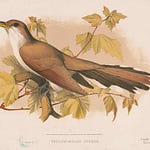Gentle readers, a few months go I spent several afternoons working on house repair with a good and generous and magnificently capable gentleman, and so I heard, on the radio he’d set to the local station, about twenty or thirty hours of current music, and gosh, it was glum! I don’t suppose it was meant to be, but you could go for days and not hear a single note of wonder or good cheer or delighted praise for somebody you love. And really, if you don’t sing hymns and you never sing out for sheer love, what do you sing about at all?
“Singing is what the lover does!” Who said that? It wasn’t Paul McCartney, but I’ll bet Paul would agree with it. It was Saint Augustine. The lover says, “How good it is that you are you!” Good, and, if we’re talking about another human being, there’s something about it that should remind us of the divine. That’s because no matter how well you know someone, you’re still like a child playing at the seashore, because the sea is still there with its endless mystery. And that’s as it should be.
Now, the middle ages and the Renaissance were the centuries for great love poetry, and it seems that everybody who wanted to stake his claim for fame wrote love sonnets — almost always with an ironic angle to them, because they well knew that love can tip your reason over the edge. The only poet who ever actually married the lady of his sonnets was Edmund Spenser, or I could say that Elizabeth Boyle was the only lady who ever said yes to her suitor the poet. Actually, Spenser wrote his sonnets, the Amoretti, as a wedding present to her, though he portrays himself in the poems as sometimes a bit addled, sometimes daft, sometimes amazed, sometimes frustrated, but always persistent and always in love.
Right in the center of the entire wedding present, which includes the Amoretti, four Cupid poems, and the wedding hymn called Epithalamion — forgive me if I don’t get into the numerical details — Spenser does something that no other sonneteer I know of did. He gives us a poem apparently written by Elizabeth, in which she defends herself against the charge of being too self-assured. It’s not pride, not standoffishness, but a powerful virtue, so that she can’t be dazzled by good fortune, or discouraged by bad fortune. And then Spenser gives us our Poem of the Week, his companion response to what she has just said.
We see in it a woman who, though young, is strong, not because she’s boorish or aggressive, but because she knows who she is, she knows right and wrong, and she is not going to have her head turned by flattery or by criticism. Imagine then a woman who has been hard to win, but when you do win her heart, you know you have won it forever, because when she gives herself, she gives for keeps. Who can be happier than a woman like that? Spenser’s got the answer. Only the man who loves her best of all — he’s the luckiest man in the world.
Thrice happy she, that is so well assured Unto herself and settled so in heart, That neither will for better be allured, Nor feared with worse to any chance to start; But like a steady ship doth strongly part The raging waves and keeps her course aright, Nor aught for tempest doth from it depart, Nor aught for fairer weather's false delight. Such self-assurance need not fear the spite Of grudging foes, nor favor seek of friends, But in the stay of her own steadfast might Neither to one herself nor other bends. Most happy she that most assured doth rest, But he most happy who such one loves best.
Word & Song is an online magazine devoted to reclaiming the good, the beautiful, and the true. We publish six essays each week, on words, classic hymn, poems, films, and popular songs, as well a weekly podcast, alternately Poetry Aloud or Anthony Esolen Speaks. To support this project, please join us as a free or paid subscriber.















Share this post